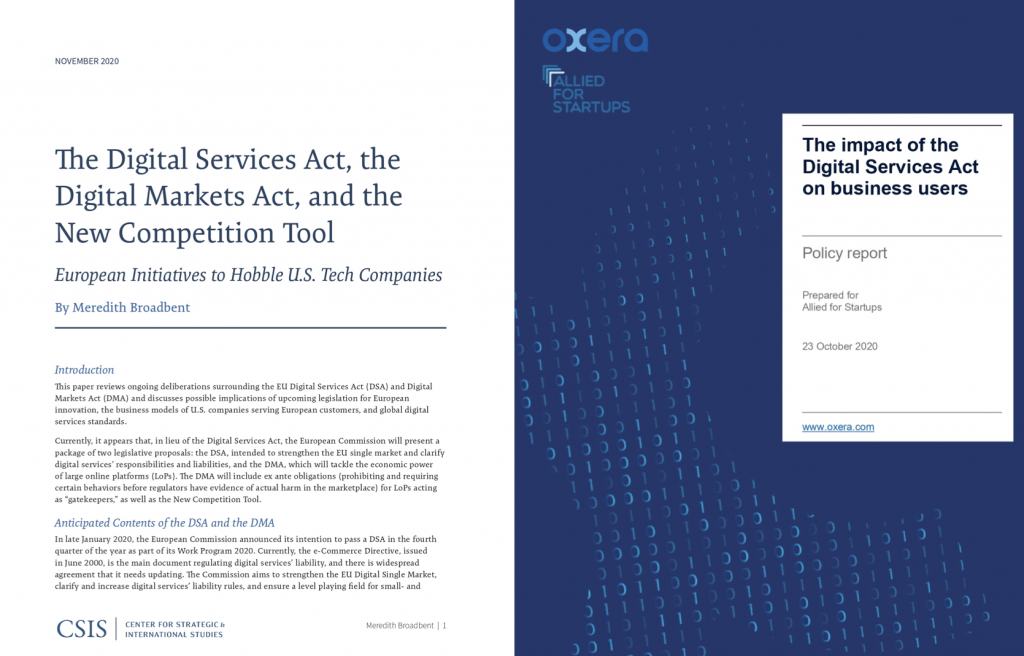
Report: Digital Markets Act, Venture Capital and Startups
 In this report produced by Beta-i both for the tech community and their policy-makers in Europe, we share analysis and recommendations on a crucial, yet unexplored, topic: the Digital Markets Act (DMA) systemic impact on European startups and scale-ups, with special emphasis on the direct or unintended consequences on venture capital investment.
In this report produced by Beta-i both for the tech community and their policy-makers in Europe, we share analysis and recommendations on a crucial, yet unexplored, topic: the Digital Markets Act (DMA) systemic impact on European startups and scale-ups, with special emphasis on the direct or unintended consequences on venture capital investment.
Available for download here, the document summarizes what the DMA is about and how it can impact European digital companies growth. But above all, shares contributions to the legislative discussion being held on the topic, such as:
# The DMA’s message that growing too much will come at the cost of being regulated ex-ante is still not enough for Europe’s ambitious digital and green transformation goals over the next decade;
# The proposal skips some necessary guiding principles for the single market’s future competitiveness. The DMA could better anticipate ways to support and prepare European startups’ journey towards a “gatekeeper” position within Europe’s digital single market;
# European companies may choose to fragment themselves to avoid reaching the “gatekeeper stage”, which will inhibit their ability to compete on the global stage;
# By being mainly focused on existing large players rather than unleashing innovation from within, the DMA proposal lacks the connection with other EU initiatives to reinforce Europe’s entrepreneurial vision;
# The DMA debate could explore the topic from a more positive perspective, establishing a competitive and inclusive vision, capable of foreseeing scenarios based on collaboration between different business stakeholders, of different sizes;
# Net VC numbers could plunge in Europe for a period still to be estimated, as the impact of the DMA on the ecosystem and the uncertainty it can generate keeps under assessment. The impact could be greater and deeper in more risk-averse investment models such as corporate ventures and regular M&A;
# The theme of mergers, acquisitions and the so-called killer acquisitions should not be framed under a “one size fits all” logic. Each merger and acquisition is the result of differing sets of circumstances which means that not every acquisition is a to-be-controlled killer one;
# The proposal of centralizing within the DMA gatekeepers’ deliberations in the European Commission is interesting and pragmatic, as long as the Commission set up minimum instruments for the Member States to provide timely context and information;
# In regard to data processing and usage, a proposal with a greater focus on what happens at the very beginning of commercial relations between the current gatekeepers and their business users (and then their final consumers/users), would be a simpler way to nudge compliance and neutralize future conflicts of interest;
# The European Commission could double-down in a systemic economic consultation to further preview and anticipate DMA’s consequences on the investment market, and the impact it will have on up-and-coming European players in the digital marketplace.
Commissioned by Google, the report actually translates Beta-i’s perspective from the inside of innovation, digital and entrepreneurship spaces in Europe. The Digital Markets Act is relevant and necessary but could improve its understanding of the interconnected nature of the tech ecosystem. This would be a way to better design any transition towards Europe’s digital competitiveness ambition. We believe it is possible to promote a free market alongside regulatory tools to ensure fair, equitable access to B2B opportunities – while giving consumers choice.



